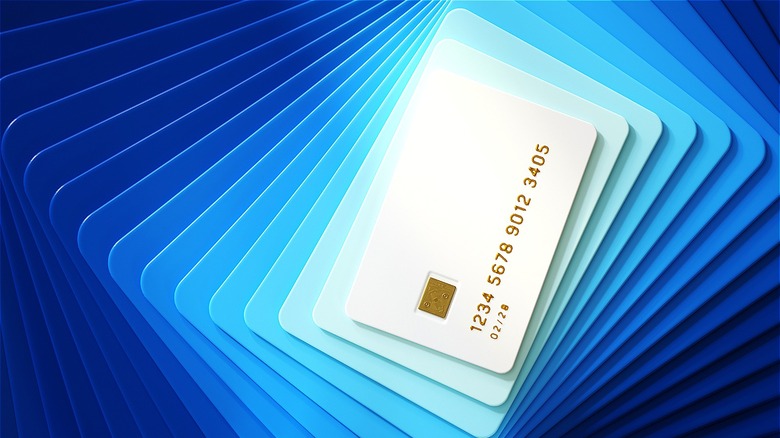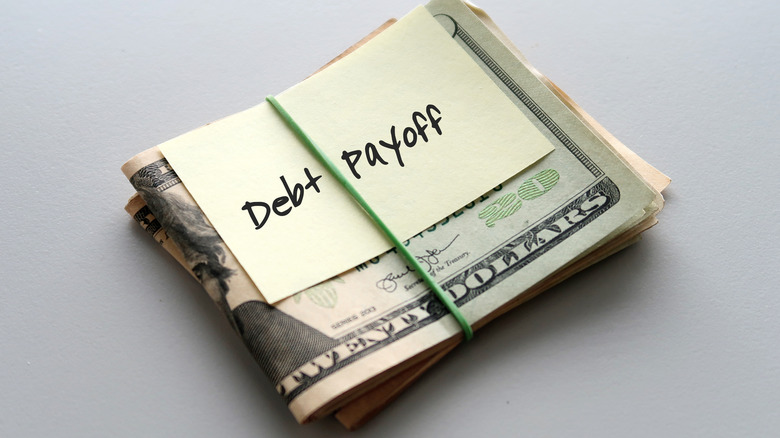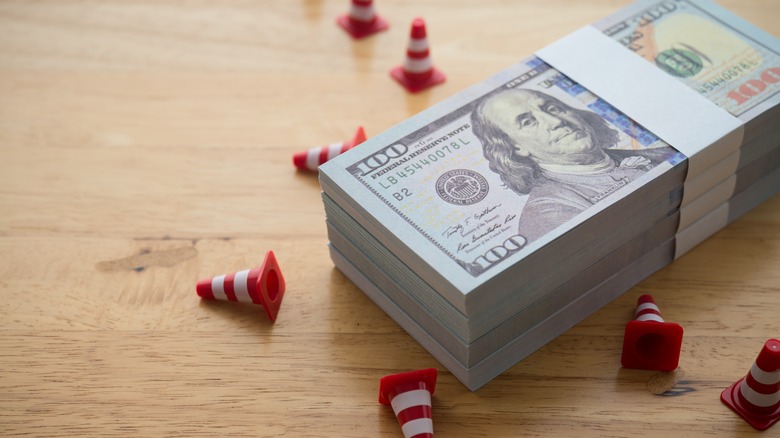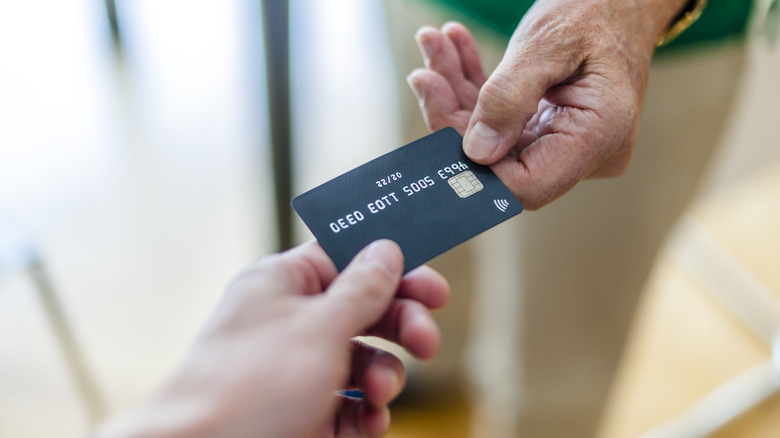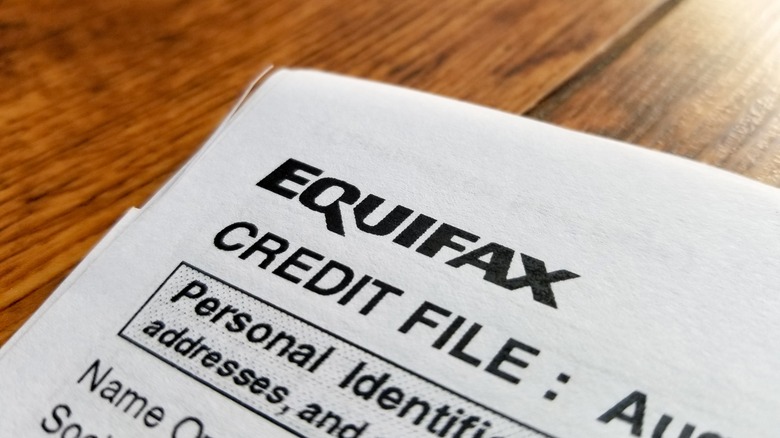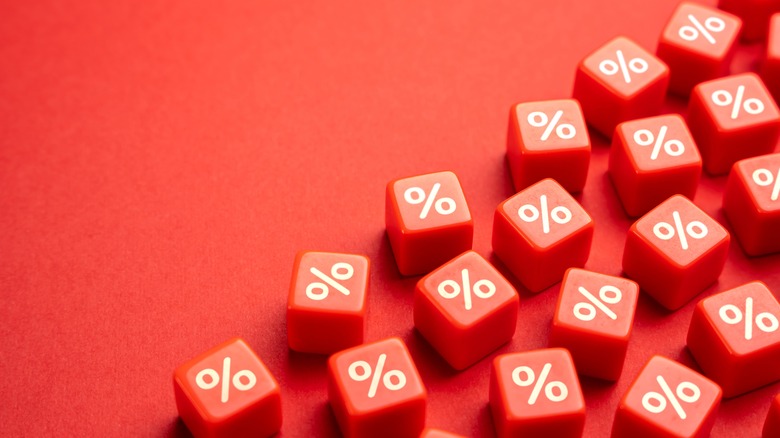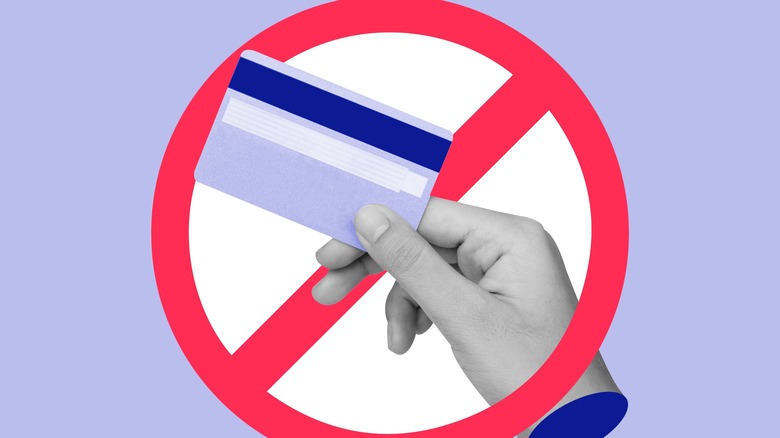10 Common Credit Card Mistakes To Avoid
The ability to buy things on credit has transformed society's financial mobility. Using a credit card to make purchases allows consumers to borrow from their future financial resources to make important purchases today. In many instances, using a credit card is met with additional perks, and therefore plenty of action items on your consumer checklist should always be paid for with one of these financial instruments. But credit card usage is rife with pitfalls and hazards. It's possible to find yourself in an increasingly desperate hole through inefficient or irresponsible credit card usage. Plenty of common credit card management mistakes can lead to this outcome, and often, users find themselves falling victim to multiple breaches. From missing payments to lax oversight of your accounts, these credit card mistakes are common among the public and can eventually spell disaster for your financial stability if you let them eat away at your money management habits for a lengthy period of time.
With the average American consumer carrying roughly four active credit cards in their wallet, conditions are primed for mistakes and a bevy of consequences for plenty of card users. Indeed, the more credit cards you have and use, the more likely you may be to find yourself in one or more of these situations as numerous due dates and payment obligations stack on top of one another. Keep these potential issues in mind and steer clear of any mistake you can to keep your credit score looking great and your financial mobility free flowing.
Only making the minimum payments
Making just your minimum payment is a big mistake. It's perhaps one of the most common issues that credit card users face considering how easy it is to only contribute the minimum requirement to service the debt while keeping an account in good standing. Making your minimum payments is a core component in credit management, but it's called the minimum for a reason. By only meeting this basic requirement, you'll almost certainly be leaving a balance to roll over into the next statement period. The result is a debt pushed forward and subjected to interest additions. Interest rates on credit cards are some of the highest you'll find among any lending product typically available in the consumer market. This means that you'll pay a potentially huge premium to borrow money and pay it back slower than you use it.
Making your minimum payments can also affect your credit score over the long term. It's not particularly damaging if you carry small balances that tack on a few extra dollars in interest charges, but racking up large balances that you ultimately can't pay back without extreme effort exponentially increases the pain by stacking on massive interest costs each month — the charges can even grow so large that your monthly interest adjustment is nearly as much as the minimum payment, creating the effect of merely treading water.
Carrying large balances
Speaking of large balances, carrying them and allowing them to roll over from month to month is the next mistake that credit card users often make. 36% of American adults have credit card debt eclipsing their emergency savings reserves, and half carry balances over from month to month on a regular basis. This means that a healthy dose of American consumers are guilty of making this mistake with their personal finances. This should give anyone suffering from stress or embarrassment over their own rolling balances a small reprieve. However, it's not a free pass to continue mismanaging your credit card accounts.
Allowing balances to carry over ensures that you pay more for the things you purchase. A $100 purchase that sits on your balance sheet for a 12-month period on a card featuring a 20% interest rate ultimately costs $120 when it's finally paid off — and likely more as a result of negative compounding interest. It's easy to write purchases off after their made, but this can only truly be done if you swipe your debit card. Then the money is debited, and the transaction is complete. With a credit card purchase, leaving it to accumulate interest charges allows the purchase to remain in a sort of "live" state, growing in cost over time. Avoiding balances that carry over from month to month is a goal that every credit card user should prioritize at all costs.
Overpaying with a non-optimized payoff strategy
There are plenty of methods that consumers use to mentally frame their credit card payoff strategy. If you're someone who has racked up more credit card debt than you can realistically handle, getting serious about eliminating it and returning to a state of financial stability is critically important. Pundits like Dave Ramsey prominently feature this task in their writings and other media outputs (Dave Ramsey's "Baby Steps" begins with interim emergency funding, and then aggressive card payoffs). But defining your strategy is a key component in achieving this goal. It's not enough to just pay more when managing your credit card bills. This is a great way to end up lost in the wilderness of interest charges and varying card due dates and balances.
Instead of indiscriminately paying more with each bill that arrives, it's necessary to build a plan that focuses on how you'll prioritize debts. Things like your student loans or mortgage debt should be pushed to the back of the line, and so too should certain credit cards. Focusing on one debt at a time helps keep you focused on intermittent goals, and helps you move from indebted to managed to unshackled. There are two main approaches, the snowball and avalanche method. Following the avalanche method saves you money over the long term by focusing on the most expensive debt first, while the snowball method allows you to clear individual accounts faster by prioritizing payoff by size (smallest first). With either, you'll pay the minimum on all but your prioritized account, and when that's cleared, you'll move on to the next bill in order until they're all gone.
Missing payments or frequently making late payments
Missing payments happens sometimes, and contributing late isn't the catastrophe it might seem. You might be assessed a late fee, have your credit limit decreased, or be subjected to a penalty APR for a certain amount of time, but it's a myth that being late or missing a payment immediately impacts your credit score. That's the silver lining, but it's not a very bright one considering the consequences that often come along for the ride.
Even without potentially devastating consequences taking effect immediately after missing a payment deadline, this is a credit management mistake that you should avoid like the plague. Getting behind on payments has a tendency to balloon in magnitude. Being late one cycle can create a knock on effect that sees you slip farther behind on the account or become late when paying other credit card bills. It's easy to frame this as pushing the payment out to the next payday. But your lifestyle is almost certainly reliant on the entire sum of your paycheck, every time you receive one. 78% of Americans live paycheck to paycheck, meaning there isn't much daylight between paydays to manage additional financial demands. Getting behind more often than not creates an uphill battle that's increasingly difficult to fight. Not only will the bill become more expensive with an added fee or heightened interest rate, but you'll have to work hard to stretch your existing income to meet both your needs in the moment and catch up on the late or missed payment.
Deciding not to read the terms associated with your card
The terms and conditions associated with your credit card are dense and sometimes difficult to get through. The document is often printed in tiny, condensed font, and components are organized in all manner of oft-confusing layouts. Terminology can be challenging, and the whole experience of reading one of these documents is truly painstaking at the best of times. It's for this reason that many card users simply don't read their terms sheet at all. In fact, people engaging in all kinds of agreements scan through terms and conditions or skip over them altogether because of how obscenely long and seemingly unimportant they are.
When it comes to your credit card, however, the terms are of extreme importance. From understanding the method by which payments are applied to different spending uses (like pay over time offers, balance transfers, and standard spending, for instance) to what you can expect when missing a payment you'll find it here. Will your interest rate rise? The answer is in your terms sheet. Reading these terms that you agree to when signing up to use the card will give you a better handle on how to manage the account in all its complexities. It's essential to take a few minutes to get through this required reading, no matter how dull or difficult it might be.
Using cash advance offers to pay off other bills
Cash advance and balance transfer offers can be a life saver for new card users. Plenty of credit cards provide elongated zero-interest balance transfer windows that make for more adept repayments over a solid period of time. Moving high interest debt to a zero-interest account and then aggressively paying it off can save you a heap of money. However, there are plenty of reasons to be skeptical of cash advance and balance transfer offers on your existing cards.
For one thing, they don't typically offer the same great terms that come with a new account. More importantly, users considering an advance to pay off other debts may not always be in the best position to responsibly use these tools. If you're dealing with a variety of debts, using a cash advance or transfer opportunity to pay off other bills can create a temporary reprieve before the debt becomes interest-bearing once again. This just kicks the can down the road and potentially upgrades your overall financial trouble to introduce higher rates or added transfer fees into the mix. It's occasionally very helpful to rely on these kinds of financial tools, but you should always use them sparingly and only after gaining a comprehensive understanding of the choice you're making. Often, they fall under the category of lending tools that ultimately keep you from achieving your goals.
Loaning your credit card to a friend or family member
This one's always rife with danger. You might hand over a credit card to a trusted family member or friend who has the best of intentions. Maybe they need it to pay for a one time purchase and you'll earn double cashback rewards if they use your card then give you the money. Other times you might offer a card to a friend in need after they are met with a temporary financial setback. This is a really generous thing to do, and speaks to your character as a person. Unfortunately, even the best of friends can't be entirely trusted or held accountable when using your money and credit line.
The problem in lending a card to someone else is that you remain the only person on the hook when it comes time to pay the bill. Allowing someone else to use your card doesn't transfer the debt to them, beyond the socially understood responsibility to pay back friends you've borrowed money from. At the end of the day, if the person borrowing your card continues to experience financial trauma or just plain stiffs you with the bill, the debt is entirely yours and there's little you can do to remedy the situation. Not everyone who offers their card will get burned, but the potential for heartache is always present, and it's best to avoid this situation altogether by keeping your card in your own back pocket.
Ignoring your credit report, card statements, and credit score
Your credit report can be pulled for free once a year from each of the three major credit bureaus: TransUnion, Equifax, and Experian. They are obligated to provide you with one copy a year without charge, and smart consumers who carefully cultivate their credit will religiously pull a report at strategic times throughout the year, separating each pull by four months to achieve equidistant and intermittent snapshots of their credit history.
This isn't the only tool you can use to keep track of the credit portion of your finances, however. Conscientious consumers also carefully explore their credit score – something that's typically available through your credit card issuer's app or web login portal. Reviewing your credit score and the factors that push and pull it in different directions on a regular basis helps you keep track of your financial health at any given time, and it's something you can do every day if you like (although changes don't happen that frequently). Perusing card statements also helps make sense of your financial health and spending habits. Even if these features act as a point of stress in your life, it's crucially important to review them at least periodically. If you don't know how much you owe in total, your credit score, and other financial data points you can't create effective strategies to create positive movement in your fiscal life.
Chasing after rewards points
Rewards points, cashback payments, and other perks that card users receive are a nice little bonus. They make card users feel good and can add up to a steady and sizeable return if you use your card intelligently and always pay your balances back in full. But chasing after rewards offers is a great way to find yourself in over your head. Cashback rewards, in particular, ultimately deliver lackluster value when taken in aggregate. You might receive 1% back on standard purchases, but the terms of your cardholder agreement might cap bonus categories at low-dollar figures, and annual fees can totally wipe out bonus cash when factored in — another great reason to read the terms. The average cashback cardholder earned $278 in 2021 in cash paid back to them, hardly enough to move the needle on any holiday plans or big spending sprees.
Rewards offers should be seen for what they are: a small perk that can make your spending a little more rewarding if the card is managed responsibly. Paying off your balance in full on a card that delivers a flat 1% cashback effectively reduces the cost of your spending by 1%, nothing to write home about, but certainly not something to scoff at either. Spending for the sake of racking up points is a great way to end up eliminating the benefit, however, as the more you spend the more likely you are to carry a balance that tips the scales against you and adds monthly interest to the card's running cost.
Totally avoiding credit products over fear of all these mistakes
Finally, it's important to remember that while credit cards can be dangerous financial instruments, they are just tools. They'll behave in a predictable manner, and if you use them responsibly they can provide a raft of benefits. Some cards build in insurance products when renting cars or purchasing expensive electronics, others deliver lounge passes while you're flying through major airports. They all help you develop your credit history, potentially marking you as a responsible borrower that can efficiently manage more important lending tools like a mortgage or car loan. Credit cards offer a starting point as you save money and look toward the future. They're a revolving line of credit that can be managed well, delivering perks and credit building opportunities, or poorly, resulting in expensive repayments and potentially wrecked credit. Almost no consumer should totally avoid credit cards entirely, instead, using them sparingly as a means to develop a lengthy credit history can deliver all the benefits without any of the associated risk. If you're just aging into adulthood, it's perhaps even a good idea to apply for a credit card and then stash it in your desk drawer for a few months. Becoming reliant on credit is definitely problematic, but good stewardship can be immensely rewarding as you grow your status toward bigger and better things.
